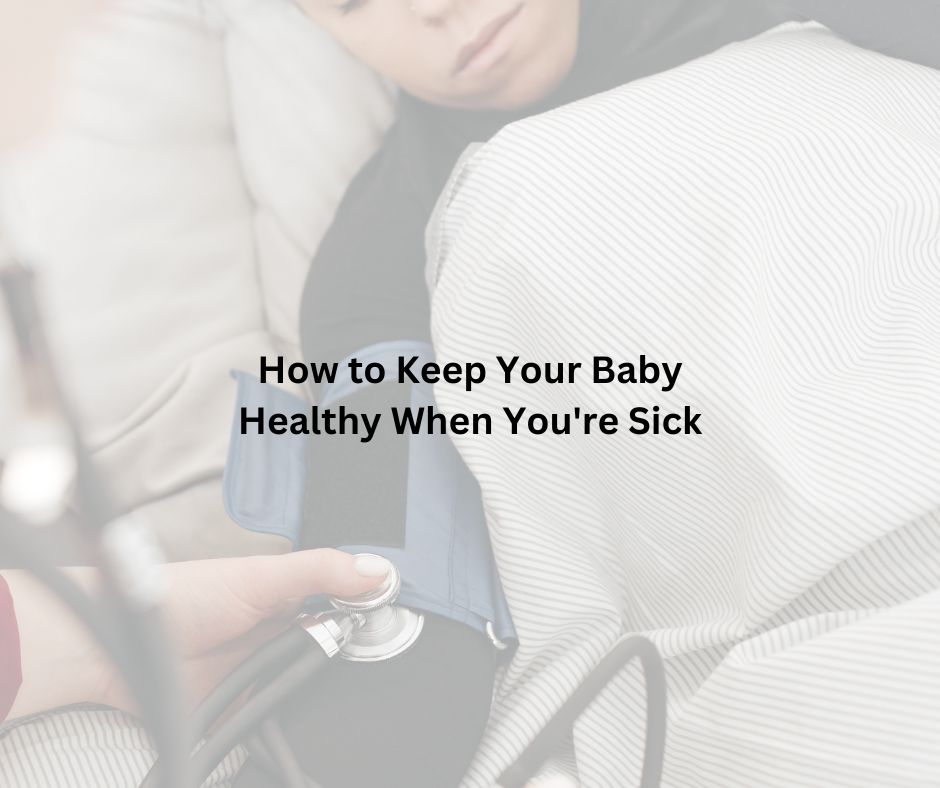How to Keep Your Baby Healthy When You're Sick
Introduction
Keeping your baby healthy is a top priority, especially when you're feeling under the weather. With their developing immune systems, babies are more susceptible to illnesses, making it essential to take extra precautions when you’re sick. This article offers practical steps and tips to ensure your little one stays well, even if you’re not feeling your best.
Understanding the Risks
Illnesses can spread through direct contact, airborne particles, and contaminated surfaces. Common illnesses that parents might pass on to their babies include colds, flu, and stomach bugs. Understanding these risks helps in taking effective preventative measures.
Preventative Measures for Parents
Practising Good Hygiene
- Washing Hands Frequently: Wash your hands thoroughly with soap and water for at least 20 seconds, especially after coughing, sneezing, or touching your face. If soap and water aren’t available, use a hand sanitizer with at least 60% alcohol.
- Using Hand Sanitizer: Keep hand sanitizer handy in places where you frequently spend time with your baby. Ensure your hands are clean before touching your baby, their toys, or their feeding supplies.
- Wearing a Mask: When you're sick, wearing a mask can significantly reduce the spread of germs. Masks catch droplets from your coughs and sneezes, preventing them from reaching your baby.
Maintaining a Clean Environment
- Disinfecting Common Surfaces: Regularly disinfect surfaces that you and your baby frequently touch, such as doorknobs, light switches, and countertops. Use a disinfectant that’s effective against viruses and bacteria.
- Cleaning Baby’s Toys and Items: Make it a habit to clean your baby’s toys, bottles, and pacifiers daily. Use hot, soapy water or a baby-safe disinfectant to ensure these items are germ-free.
- Ensuring Proper Ventilation: Good ventilation can help reduce the concentration of airborne viruses. Open windows to let fresh air circulate whenever possible.
Benefits of Breastfeeding While Sick
Breastfeeding provides your baby with antibodies that can boost their immune system and help them fight off infections. Unless advised otherwise by your doctor, continue breastfeeding even when you’re sick.
Safe Practices for Breastfeeding
- Wearing a Mask While Breastfeeding: Wear a mask during breastfeeding to prevent respiratory droplets from reaching your baby.
- Properly Cleaning Breasts and Pump Equipment: Ensure your breasts and any breastfeeding equipment, like pumps, are clean before each use. This helps prevent the transmission of germs.
Boosting Baby’s Immune System
A strong immune system can help your baby fight off illnesses more effectively.
- Importance of a Healthy Diet: Feed your baby nutrient-rich foods appropriate for their age. Breast milk or formula provides essential nutrients that support immune health.
- Ensuring Baby Gets Enough Sleep: Adequate sleep is crucial for a strong immune system. Establish a consistent sleep routine to help your baby get the rest they need.
- Regular Pediatric Check-ups: Ensure your baby is up-to-date with their vaccinations. Immunizations protect against various serious illnesses.
Practical Tips for Everyday Care
- Limiting Baby’s Exposure to Sick Individuals: Avoid having sick family members or friends visit your baby. Limit your baby’s exposure to large gatherings where they might come into contact with sick individuals.
- Designating a Healthy Caregiver If Possible: If there’s another healthy adult in the household, consider having them take over caregiving duties while you recover.
Emotional Support for Parents
- Managing Stress While Sick: Being sick and taking care of a baby can be stressful. Practice stress-relief techniques such as deep breathing, meditation, or listening to calming music.
- Seeking Support from Family and Friends: Don’t hesitate to ask for help from family and friends. They can assist with chores, provide meals, or take care of your baby while you rest.
Additional Tip
In addition to all these measures, choosing the right diaper for your baby can contribute to their overall comfort and health. For instance, using high-quality diapers can help keep your baby dry and reduce the risk of skin irritations, which is crucial when maintaining their health in challenging times.
Understanding When to Seek Medical Help
- Recognizing Severe Symptoms in Babies: Be aware of severe symptoms such as difficulty breathing, high fever, or persistent vomiting. These warrant immediate medical attention.
- Emergency Contacts and Resources: Have emergency contact numbers and resources readily available. Know the location of the nearest hospital and have your pediatrician’s contact information handy.
Conclusion
Keeping your baby healthy when you’re sick involves a combination of good hygiene, maintaining a clean environment, and boosting your baby’s immune system. By taking these steps and staying vigilant, you can minimise the risk of passing on your illness to your little one. Remember, seeking help and taking care of yourself is equally important to ensure you can care for your baby effectively.
FAQs
- Can I breastfeed my baby if I have a cold? Yes, you can continue breastfeeding if you have a cold. Breast milk provides antibodies that can help protect your baby from getting sick.
- How often should I disinfect surfaces in my home? Disinfect common surfaces daily or more frequently if you’re sick to reduce the spread of germs.
- What are the signs that my baby is getting sick? Common signs include fever, cough, runny nose, changes in feeding and sleeping patterns, and irritability.
- Should I keep my baby away from other family members if I’m sick? Yes, try to limit your baby’s exposure to other sick family members to reduce the risk of infection.
What should I do if my baby shows symptoms of illness? Contact your pediatrician immediately for advice and potential treatment options. Early intervention is key to managing your baby’s health.

